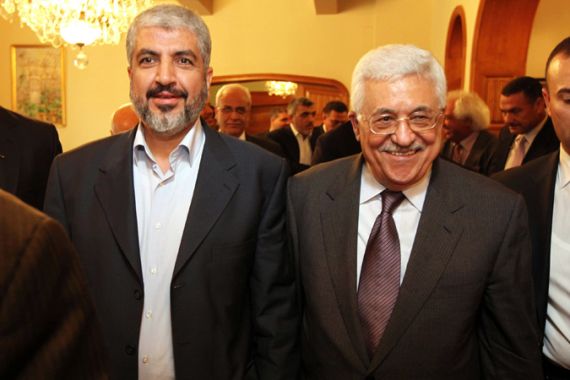Hamas re-elects Khaled Meshaal as leader
Election for head of Palestinian faction backed by regional powers Qatar, Egypt and Turkey took place in Cairo.

Hamas has re-elected its veteran leader, Khaled Meshaal, in the Egyptian capital, Cairo, two Hamas officials said.
“The leaders of Hamas chose Meshaal,” a high-ranking official told the AFP news agency by telephone from Cairo on Monday, requesting anonymity.
The officials said the majority of the group’s Shura council members voted for Meshaal. They spoke on condition of anonymity because they were not authorised to discuss the secret procedure.
Meshaa, 56, who has run the Palestinian movement since 1996 from exile, was seen as a favourite. He is backed by regional powers Qatar, Turkey and Egypt and is now based in Qatar.
His re-election could revive stalled reconciliation efforts between Hamas and political rival Mahmoud Abbas, the Western-backed Palestinian president based in Ramallah, West Bank.
Meshaal has pushed for reconciliation, but has been blocked by Hamas hardliners in Gaza who fear a unity deal will give Abbas a new foothold in Gaza and weaken Hamas’ grip on the territory.
Last year, Meshaal and Abbas, who have cordial relations, reached a deal whereby Abbas would head an interim government of technocrats in the West Bank and Gaza.
This government would have paved the way for general elections. However, the deal never got off the ground because of opposition from Hamas leaders in Gaza and senior figures in Abbas’ Fatah movement.
Last week, the Emir of Qatar proposed holding a reconciliation conference in Egypt in the coming weeks to set up a timetable for forming the interim government and holding elections.
Asked about the conference on Monday, Abbas seemed ambivalent. Speaking in Ramallah, he said he would attend such a conference if invited, but that, “in principle, there are no problems between us that require all these efforts”.
Divide and conquer
In 2006, Hamas swept the Palestinian elections winning a majority in the Palestinian parliament under Abbas, who was elected president in 2005 after the death of former president Yasser Arafat.
Following the Hamas victory, Israel and the Quartet on the Middle East – made up of the UN, US, EU and Russia – imposed harsh economic sanctions against the Palestinian National Authority and the occupied Palestinian territories.
Israel and the Quartet said sanctions would be lifted only if Hamas renounced the use of violent resistance, recognised the right of Israel to exist as a Jewish state and accepted all previous agreements between Israel and the Palestinian National Authority.
Hamas refused, and Fatah tried to oust Hamas from the government – a fight that quickly turned into a brutal civil war in which Hamas took over Gaza and ousted Fatah.
International sanctions on the Palestinian Authority, which remained in power in the West Bank, were lifted and a severe blockade of Hamas-governed Gaza was imposed that continues to this day.
The Hamas resistance movement was founded in Gaza in 1987 as an offshoot of the region’s Egyptian-founded Muslim Brotherhood.
Hamas leaders, including Meshaal, refuse to recognise Israel as a ‘Jewish-only state’ or to denounce violent resistance against the Israeli occupation.